Submitted:
09 January 2024
Posted:
09 January 2024
You are already at the latest version
Abstract
Keywords:
1. Introduction
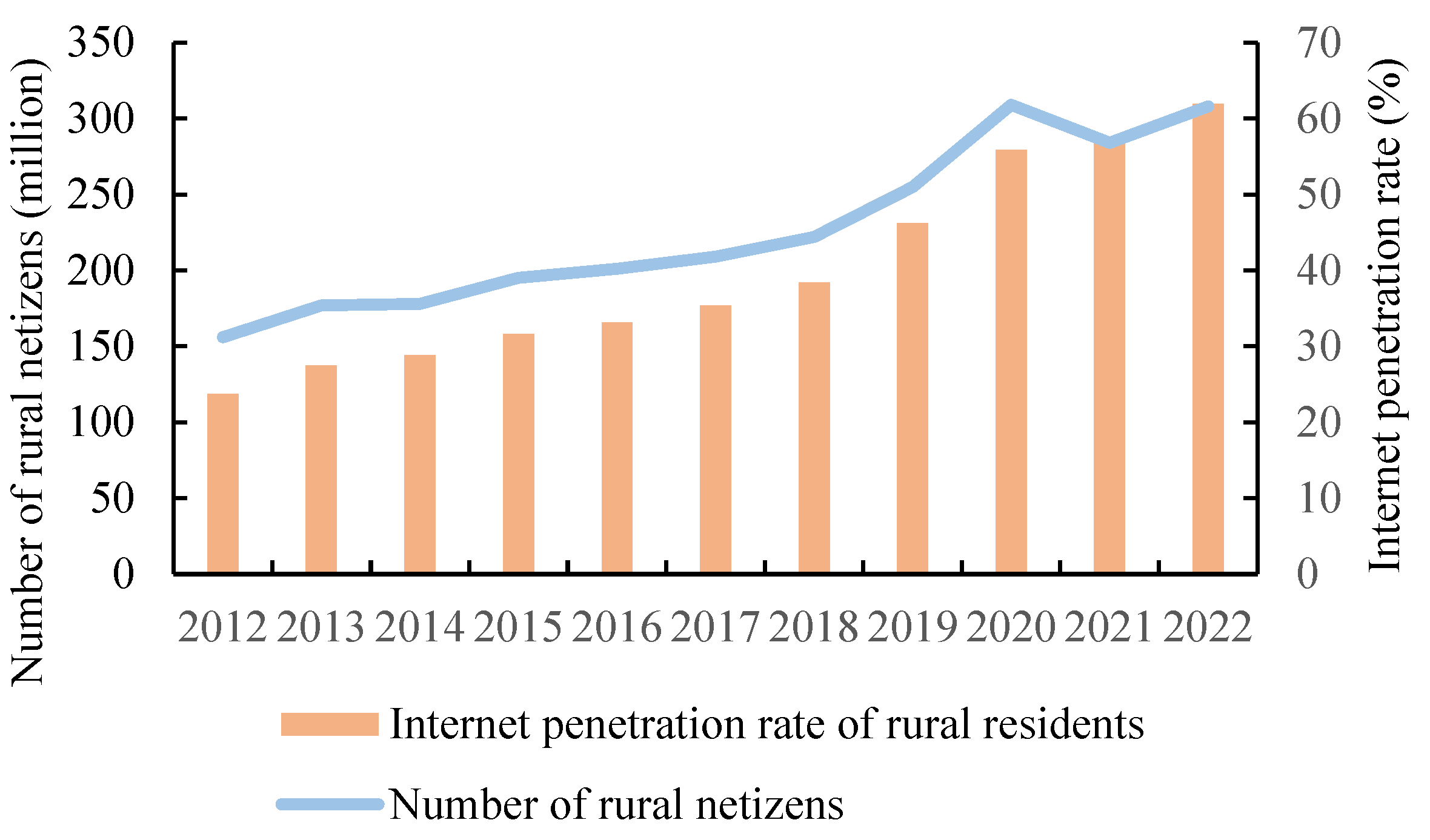
2. Theoretical analysis and research hypotheses
2.1. Direct effects of the DATES
2.2. Heterogeneous effects of the DATES
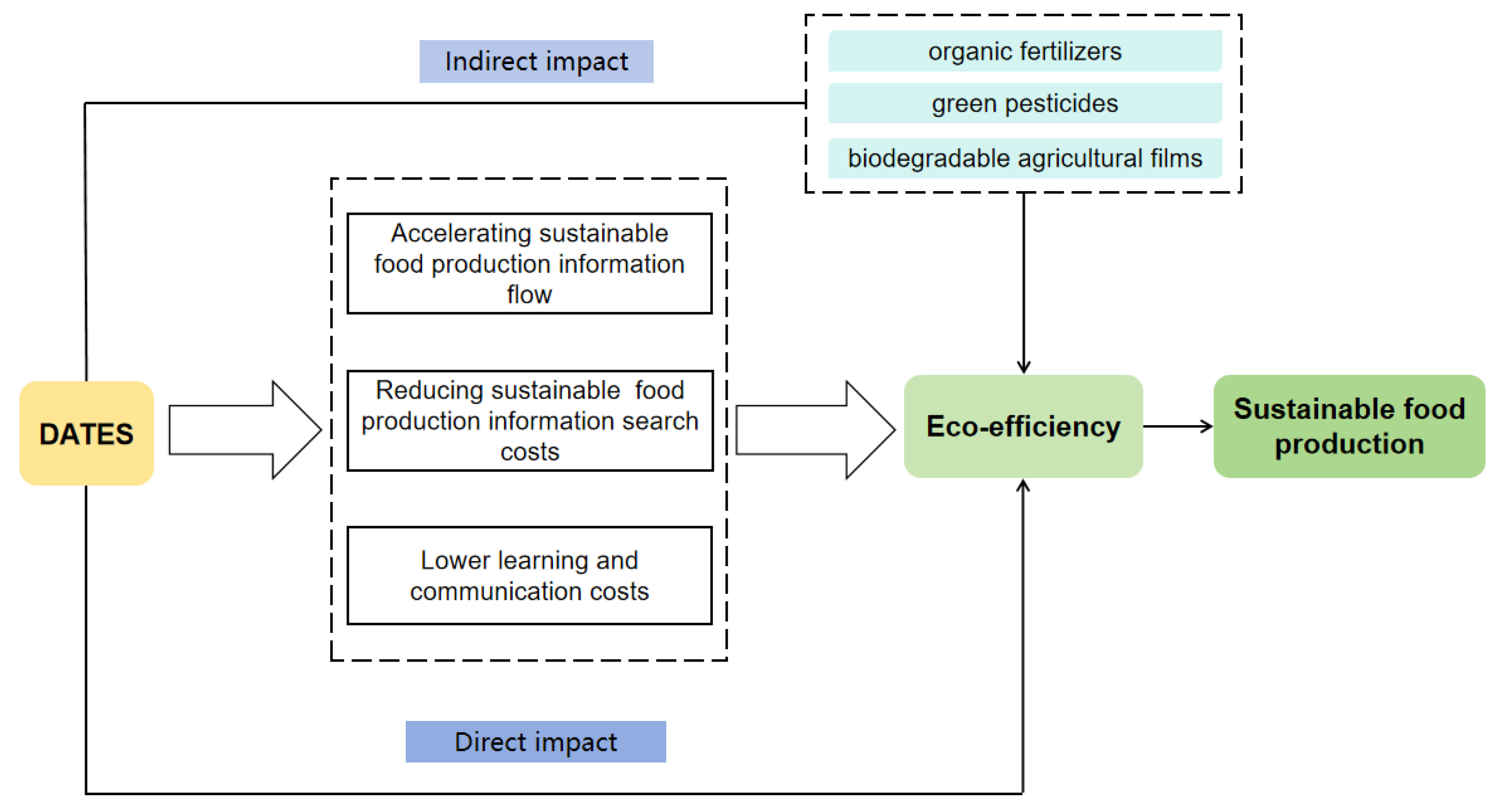
2.3. Mediation effects of the DATES
3. Materials and Methods
3.1. Data Collection
3.2. Methodology
3.2.1. The slack-based measure (SBM) model
3.2.2. Endogenous switching regression (ESR) model
3.2.3. Quantile regression (QR) model
3.2.4. Mediation effects model
4. Results and Discussion
4.1. Descriptive Statistics
| Source | Carbon emission coefficient | References |
|---|---|---|
| Fertilizer | 0.896 kg/ kg | Oak Ridge National Laboratory |
| Pesticide | 4.934 kg /kg | Oak Ridge National Laboratory |
| Diesel fuel | 0.593 kg/ kg | Intergovernmental Panel on Climate Change (IPCC) |
| Agricultural film | 5.180 kg/ kg | Institute of Resource, Ecosystem and Environment of Agriculture, Nanjing Agricultural University |
| Deep plow | 312.600 kg/ km2 | College of Biological Sciences, China Agricultural University |
| Irrigation | 25 kg/ ha | Dubey [57] |
| Region | Loss rate (%) | |
|---|---|---|
| Nitrogen fertilizer | Phosphate fertilizer | |
| Liaoning and Jilin | 20 | 4 |
| Heilongjiang | 10 | 7 |
| Variable | Total | DATES users | DATES nonusers | Difference |
|---|---|---|---|---|
| Desirable output (yuan/ha) | 26025.579 | 27526.312 | 22874.039 | 4652.272*** |
| Land (yuan/ha) | 1494.617 | 1550.556 | 1377.147 | 173.409* |
| Seed (yuan/ha) | 753.073 | 669.033 | 84.040 | 753.073 |
| Fertilizer (yuan/ha) | 2460.384 | 2508.372 | 2358.552 | 149.821** |
| Labor (yuan/ha) | 7658.409 | 7519.770 | 7952.627 | -432.857** |
| Others (yuan/ha) | 1197.574 | 1232.485 | 1124.271 | 108.214** |
| Total carbon emission (kg/ha) | 1387.381 | 1467.790 | 1216.716 | 276.073** |
| Total nitrogen loss (kg/ha) | 170.3187 | 176.4504 | 157.302 | 19.1484 |
| Total phosphorus loss (kg/ha) | 34.3683 | 34.8462 | 33.3639 | 1.4823 |
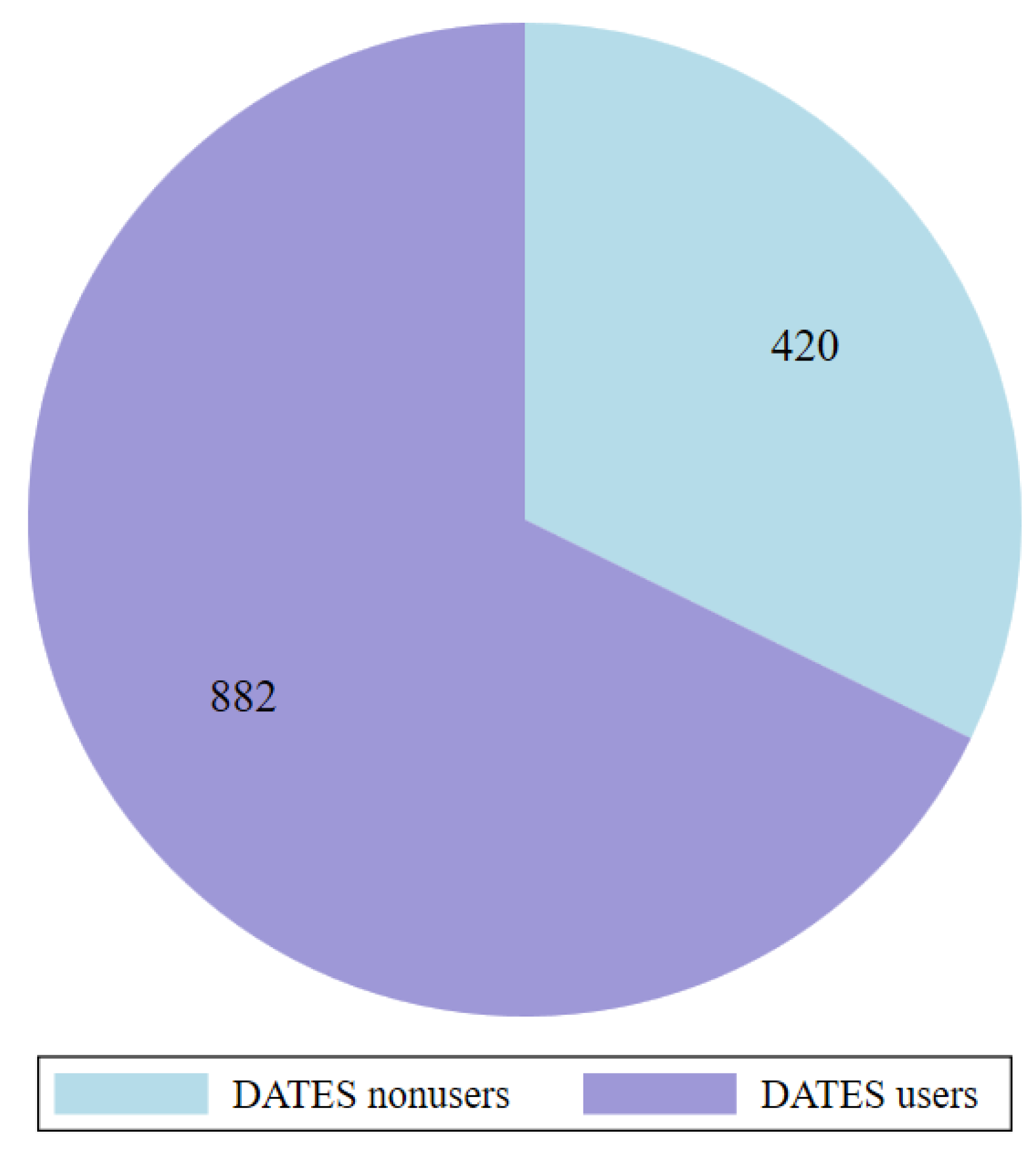
4.2. Eco-efficiency scores
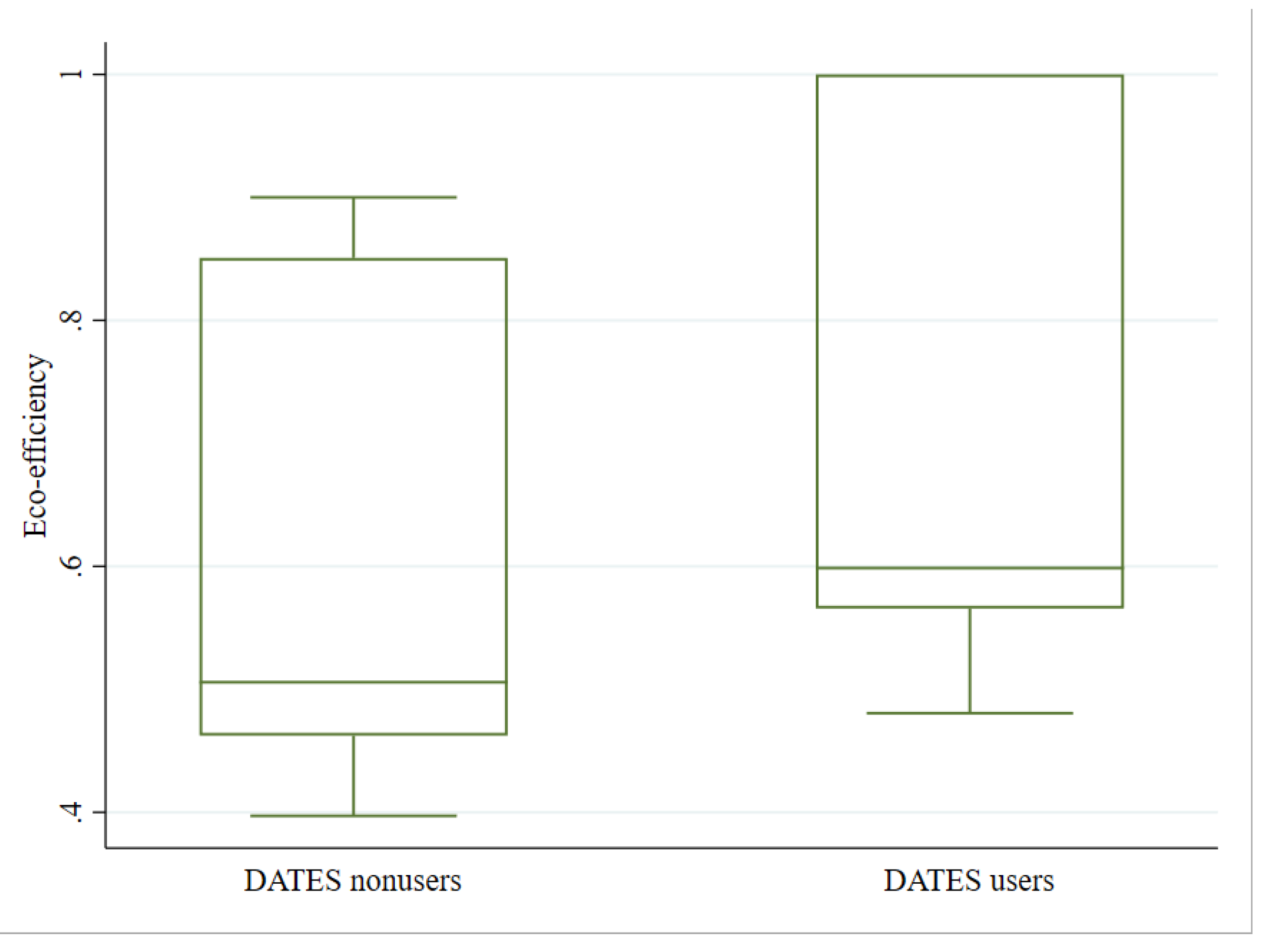
4.3. Results of the ESR model
4.3.1. Determinants of DATES use
4.3.2. Determinants of EE
4.3.3. Average treatment effects
4.4. Robustness check
4.5. Heterogeneous analysis
4.6. Mechanism analysis
5. Conclusions and Policy implications
Author Contributions
Funding
Institutional Review Board Statement
Informed Consent Statement
Data Availability Statement
Acknowledgments
Conflicts of Interest
References
- Yang, J.; Jiang, R.; Zhang, H.; He, W.; Yang, J.; He, P. Modelling maize yield, soil nitrogen balance and organic carbon changes under long-term fertilization in Northeast China. J. Environ. Manag. 2023, 325, 116454. [Google Scholar] [CrossRef] [PubMed]
- Zhang, W.; Qiao, Y.; Lakshmanan, P.; Yuan, L.; Liu, J.; Zhong, C.; Chen, X. Combing public-private partnership and large-scale farming increased net ecosystem carbon budget and reduced carbon footprint of maize production. Resour. Conserv. Recycl. 2022, 184, 106411. [Google Scholar] [CrossRef]
- FAO. FAO statistical databases. Available online: https://www.fao.org/faostat/en/#data/QCL (accessed on 2023).
- Liu, Y.S.; Zou, L.L.; Wang, Y.S. Spatial-temporal characteristics and influencing factors of agricultural eco-efficiency in China in recent 40 years. Land. Use Policy 2020, 97, 10. [Google Scholar] [CrossRef]
- Pang, J.X.; Chen, X.P.; Zhang, Z.L.; Li, H.J. Measuring Eco-Efficiency of Agriculture in China. Sustainity 2016, 8, 15. [Google Scholar] [CrossRef]
- Wu, F.; Zhan, J.Y.; Guneralp, I. Present and future of urban water balance in the rapidly urbanizing Heihe River Basin, Northwest China. Ecol. Model. 2015, 318, 254–264. [Google Scholar] [CrossRef]
- Shen, Z.; Qiu, J.; Hong, Q.; Chen, L. Simulation of spatial and temporal distributions of non-point source pollution load in the Three Gorges Reservoir Region. Sci. Total Environ. 2014, 493, 138–146. [Google Scholar] [CrossRef] [PubMed]
- Hu, L.L.; Guo, L.; Zhao, L.F.; Shi, X.Y.; Ren, W.Z.; Zhang, J.; Tang, J.J.; Chen, X. Productivity and the complementary use of nitrogen in the coupled rice-crab system. Agric. Syst. 2020, 178, 102742. [Google Scholar] [CrossRef]
- Lazaridou, D.; Michailidis, A.; Trigkas, M. Socio-economic factors influencing farmers' willingness to undertake environmental responsibility. Environ. Sci. Pollut. Res. Int. 2019, 26, 14732–14741. [Google Scholar] [CrossRef]
- Li, F.; Yang, P.; Zhang, K.; Yin, Y.; Zhang, Y.; Yin, C. The influence of smartphone use on conservation agricultural practice: Evidence from the extension of rice-green manure rotation system in China. Sci. Total Environ. 2022, 813, 152555. [Google Scholar] [CrossRef]
- Zou, L.; Liu, Y.; Wang, Y.; Hu, X. Assessment and analysis of agricultural non-point source pollution loads in China: 1978-2017. J. Environ. Manag. 2020, 263, 110400. [Google Scholar] [CrossRef]
- Zhong, F.L.; Jiang, D.W.; Zhao, Q.Q.; Guo, A.J.; Ullah, A.; Yang, X.; Cheng, Q.P.; Zhang, Y.N.; Ding, X.J. Eco-efficiency of oasis seed maize production in an arid region, Northwest China. J. Clean. Prod. 2020, 268, 10. [Google Scholar] [CrossRef]
- Schaltegger, S.; Sturm, A. Ökologische Rationalität: Ansatzpunkte zur Ausgestaltung von ökologieorientierten Managementinstrumenten. Die Unternehm. 1990, 44, 273–290. [Google Scholar]
- Caiado, R.G.G.; de Freitas Dias, R.; Mattos, L.V.; Quelhas, O.L.G.; Leal Filho, W. Towards sustainable development through the perspective of eco-efficiency - A systematic literature review. J. Clean. Prod. 2017, 165, 890–904. [Google Scholar] [CrossRef]
- Deng, X.Z.; Gibson, J. Improving eco-efficiency for the sustainable agricultural production: A case study in Shandong, China. Technol. Forecast. Soc. Chang. 2019, 144, 394–400. [Google Scholar] [CrossRef]
- Mickwitz, P.; Melanen, M.; Rosenstrom, U.; Seppala, J. Regional eco-efficiency indicators - a participatory approach. J. Clean. Prod. 2006, 14, 1603–1611. [Google Scholar] [CrossRef]
- Rebolledo-Leiva, R.; Angulo-Meza, L.; Iriarte, A.; Gonzalez-Araya, M.C.; Vasquez-Ibarra, L. Comparing two CF+DEA methods for assessing eco-efficiency from theoretical and practical points of view. Sci. Total Environ. 2019, 659, 1266–1282. [Google Scholar] [CrossRef] [PubMed]
- Bianchi, M.; del Valle, I.; Tapia, C. Measuring eco-efficiency in European regions: Evidence from a territorial perspective. J. Clean. Prod. 2020, 276, 123246. [Google Scholar] [CrossRef]
- Zeng, L.L.; Li, X.Y.; Ruiz-Menjivar, J. The effect of crop diversity on agricultural eco-efficiency in China: A blessing or a curse? J. Clean. Prod. 2020, 276, 13. [Google Scholar] [CrossRef]
- Gao, Y.; Zhao, D.; Yu, L.; Yang, H. Influence of a new agricultural technology extension mode on farmers' technology adoption behavior in China. J. Rural. Stud. 2020, 76, 173–183. [Google Scholar] [CrossRef]
- Mahmood, N.; Arshad, M.; Mehmood, Y.; Faisal Shahzad, M.; Kächele, H. Farmers’ perceptions and role of institutional arrangements in climate change adaptation: Insights from rainfed Pakistan. Clim. Risk Manag. 2021, 32, 100288. [Google Scholar] [CrossRef]
- Oyinbo, O.; Chamberlin, J.; Abdoulaye, T.; Maertens, M. Digital extension, price risk, and farm performance: experimental evidence from Nigeria. Am. J. Agric. Econ. 2022, 104, 831–852. [Google Scholar] [CrossRef]
- Buehren, N.; Goldstein, M.; Molina, E.; Vaillant, J. The impact of strengthening agricultural extension services on women farmers: Evidence from Ethiopia. Agric. Econ-Blackwell 2019, 50, 407–419. [Google Scholar] [CrossRef]
- Hudson, H.E.; Leclair, M.; Pelletier, B.; Sullivan, B. Using radio and interactive ICTs to improve food security among smallholder farmers in Sub-Saharan Africa. Telecommun. Policy 2017, 41, 670–684. [Google Scholar] [CrossRef]
- 25. CNNIC. The 51th China Statistical Report. on Internet Development, 2023.
- Mohammadi, A.; Rafiee, S.; Jafari, A.; Dalgaard, T.; Knudsen, M.T.; Keyhani, A.; Mousavi-Avval, S.H.; Hermansen, J.E. Potential greenhouse gas emission reductions in soybean farming: a combined use of Life Cycle Assessment and Data Envelopment Analysis. J. Clean. Prod. 2013, 54, 89–100. [Google Scholar] [CrossRef]
- Masuda, K. Measuring eco-efficiency of wheat production in Japan: a combined application of life cycle assessment and data envelopment analysis. J. Clean. Prod. 2016, 126, 373–381. [Google Scholar] [CrossRef]
- Ullah, A.; Perret, S.R.; Gheewala, S.H.; Soni, P. Eco-efficiency of cotton-cropping systems in Pakistan: an integrated approach of life cycle assessment and data envelopment analysis. J. Clean. Prod. 2016, 134, 623–632. [Google Scholar] [CrossRef]
- Huang, M.L.; Zeng, L.L.; Liu, C.J.; Li, X.Y.; Wang, H.L. Research on the Eco-Efficiency of Rice Production and Its Improvement Path: A Case Study from China. Int. J. Environ. Res. Pub He 2022, 19, 20. [Google Scholar] [CrossRef] [PubMed]
- Rashidi, K.; Saen, R.F. Measuring eco-efficiency based on green indicators and potentials in energy saving and undesirable output abatement. Energy Econ. 2015, 50, 18–26. [Google Scholar] [CrossRef]
- Yang, L.; Zhang, X. Assessing regional eco-efficiency from the perspective of resource, environmental and economic performance in China: A bootstrapping approach in global data envelopment analysis. J. Clean. Prod. 2018, 173, 100–111. [Google Scholar] [CrossRef]
- Xin, Y.; Tao, F. Optimizing genotype-environment-management interactions to enhance productivity and eco-efficiency for wheat-maize rotation in the North China Plain. Sci. Total Environ. 2019, 654, 480–492. [Google Scholar] [CrossRef]
- Oliveira, R.; Camanho, A.S.; Zanella, A. Expanded eco-efficiency assessment of large mining firms. J. Clean. Prod. 2017, 142, 2364–2373. [Google Scholar] [CrossRef]
- Yang, L.; Yang, Y. Evaluation of eco-efficiency in China from 1978 to 2016: Based on a modified ecological footprint model. Sci Total Environ. 2019, 662, 581–590. [Google Scholar] [CrossRef] [PubMed]
- Zeng, J.J.; Han, J.Y.; Qu, J.S.; Maraseni, T.N.; Xu, L.; Li, H.J.; Liu, L.N. Ecoefficiency of China's agricultural sector: What are the spatiotemporal characteristics and how are they determined? J. Clean. Prod. 2021, 325, 11. [Google Scholar] [CrossRef]
- He, G.J.; Ma, Z.G.; Wang, X.N.; Xiao, Z.; Dong, J.R. Does the improvement of regional eco-efficiency improve the residents' health conditions: Empirical analysis from China's provincial data. Ecol. Indic. 2021, 124, 107387. [Google Scholar] [CrossRef]
- Aigner, D.; Lovell, C.A.K.; Schmidt, P. Formulation and estimation of stochastic frontier production function models. J. Econom. 1977, 6, 21–37. [Google Scholar] [CrossRef]
- Meeusen, W.; van Den Broeck, J. Efficiency Estimation from Cobb-Douglas Production Functions with Composed Error. Int. Econ. Rev. 1977, 18, 435–444. [Google Scholar] [CrossRef]
- Jin, G.; Li, Z.; Deng, X.; Yang, J.; Chen, D.; Li, W. An analysis of spatiotemporal patterns in Chinese agricultural productivity between 2004 and 2014. Ecol Indic 2019, 105, 591–600. [Google Scholar] [CrossRef]
- Charnes, A.; Cooper, W.W.; Rhodes, E. Measuring the efficiency of decision making units. Eur. J. Oper. Res. 1978, 2, 429–444. [Google Scholar] [CrossRef]
- Angulo-Meza, L.; González-Araya, M.; Iriarte, A.; Rebolledo-Leiva, R.; Soares de Mello, J.C. A multiobjective DEA model to assess the eco-efficiency of agricultural practices within the CF + DEA method. Comput. Electron. Agric. 2019, 161, 151–161. [Google Scholar] [CrossRef]
- Tone, K. A slacks-based measure of efficiency in data envelopment analysis. Eur. J. Oper. Res. 2001, 130, 498–509. [Google Scholar] [CrossRef]
- Adamides, G.; Stylianou, A. Evaluation of the Radio as an Agricultural Information Source in Rural Areas. J. Agric. Food Inf. 2018, 19, 362–376. [Google Scholar] [CrossRef]
- Li, B.; Zhuo, N.; Ji, C.; Zhu, Q. Influence of Smartphone-Based Digital Extension Service on Farmers’ Sustainable Agricultural Technology Adoption in China. Int. J. Environ. Res. Public Health 2022, 19, 9639. [Google Scholar] [CrossRef] [PubMed]
- Norton, G.W.; Alwang, J. Changes in Agricultural Extension and Implications for Farmer Adoption of New Practices. Appl. Econ. Perspect. P. 2020, 42, 8–20. [Google Scholar] [CrossRef]
- Ma, Q.; Zheng, S.; Deng, P. Impact of Internet Use on Farmers’ Organic Fertilizer Application Behavior under the Climate Change Context: The Role of Social Network. Land 2022, 11, 1601. [Google Scholar] [CrossRef]
- Fabregas, R.; Kremer, M.; Schilbach, F. Realizing the potential of digital development: The case of agricultural advice. Science 2019, 366, eaay3038. [Google Scholar] [CrossRef] [PubMed]
- Steinke, J.; Achieng, J.O.; Hammond, J.; Kebede, S.S.; Mengistu, D.K.; Mgimiloko, M.G.; Mohammed, J.N.; Musyoka, J.; Sieber, S.; van de Gevel, J.; et al. Household-specific targeting of agricultural advice via mobile phones: Feasibility of a minimum data approach for smallholder context. Comput. Electron. Agric. 2019, 162, 991–1000. [Google Scholar] [CrossRef]
- Fernando, A.N. Seeking the treated: The impact of mobile extension on farmer information exchange in India. J. Dev. Econ. 2021, 153, 102713. [Google Scholar] [CrossRef]
- Zheng, Y.; Fan, Q.; Jia, W. How Much Did Internet Use Promote Grain Production?—Evidence from a Survey of 1242 Farmers in 13 Provinces in China. Foods 2022, 11, 1389. [Google Scholar] [CrossRef]
- Hou, J.; Huo, X.; Yin, R. Does computer usage change farmers’ production and consumption? Evidence from China. China Agric. Econ. Rev. 2018, 11, 387–410. [Google Scholar] [CrossRef]
- Khanal, A.R.; Mishra, A.K. Financial performance of small farm business households: the role of internet. China Agric. Econ. Rev. 2016, 8, 553–571. [Google Scholar] [CrossRef]
- Di Falco, S.; Veronesi, M.; Yesuf, M. Does Adaptation to Climate Change Provide Food Security? A Micro-Perspective from Ethiopia. Am. J. Agric. Econ. 2011, 93, 829–846. [Google Scholar] [CrossRef]
- Huang, J.K.; Wang, Y.J.; Wang, J.X. Farmers' Adaptation to Extreme Weather Events through Farm Management and Its Impacts on the Mean and Risk of Rice Yield in China. Am. J. Agric. Econ. 2015, 97, 602–617. [Google Scholar] [CrossRef]
- Läpple, D.; Hennessy, T.; Newman, C. Quantifying the Economic Return to Participatory Extension Programmes in Ireland: an Endogenous Switching Regression Analysis. J. Agric. Econ. 2013, 64, 467–482. [Google Scholar] [CrossRef]
- Zhu, X.; Hu, R.; Zhang, C.; Shi, G. Does Internet use improve technical efficiency? Evidence from apple production in China. Technol. Forecast. Soc. Chang. 2021, 166. [Google Scholar] [CrossRef]
- Dubey, A.; Lal, R. Carbon footprint and sustainability of agricultural production systems in Punjab, India, and Ohio, USA. J. Crop Improv. 2009, 23, 332–350. [Google Scholar] [CrossRef]
- Lai, S.Y.; Du, P.F.; Chen, J.N. Evaluation of non-point source pollution based on unit analysis. J. T Singhua Univ. 2004, 44, 1184–1187. [Google Scholar] [CrossRef]
- Song, C.; Liu, R.; Oxley, L.; Ma, H. The adoption and impact of engineering-type measures to address climate change: evidence from the major grain-producing areas in China. Aust. J. Agric. Resour. Econ. 2018, 62, 608–635. [Google Scholar] [CrossRef]
- Ma, W.; Nie, P.; Zhang, P.; Renwick, A. Impact of Internet use on economic well-being of rural households: Evidence from China. Rev. Dev. Econ. 2020, 24, 503–523. [Google Scholar] [CrossRef]
- Huang, Y.; Luo, X.; Liu, D.; Du, S.; Yan, A.; Tang, L. Pest control ability, technical guidance, and pesticide overuse: evidence from rice farmers in rural China. Environ. Sci. Pollut. R. 2021, 28, 39587–39597. [Google Scholar] [CrossRef]
- Zheng, H.; Ma, W.; Wang, F.; Li, G. Does internet use improve technical efficiency of banana production in China? Evidence from a selectivity-corrected analysis. Food Policy 2021, 102. [Google Scholar] [CrossRef]
- Khataza, R.R.B.; Hailu, A.; Doole, G.J.; Kragt, M.E.; Alene, A.D. There is growing evidence that elderly farmers may be less likely to employ new technology because of path-dependence effect. Agric. Econ-Blackwell 2019, 50, 237–246. [Google Scholar] [CrossRef]
- Desiere, S.; Jolliffe, D. Land productivity and plot size: Is measurement error driving the inverse relationship? J. Dev. Econ. 2018, 130, 84–98. [Google Scholar] [CrossRef]
- Maddala, G.S. Limited-dependent and qualitative variables in econometrics; Cambridge university press: 1983.
Disclaimer/Publisher’s Note: The statements, opinions and data contained in all publications are solely those of the individual author(s) and contributor(s) and not of MDPI and/or the editor(s). MDPI and/or the editor(s) disclaim responsibility for any injury to people or property resulting from any ideas, methods, instructions or products referred to in the content. |

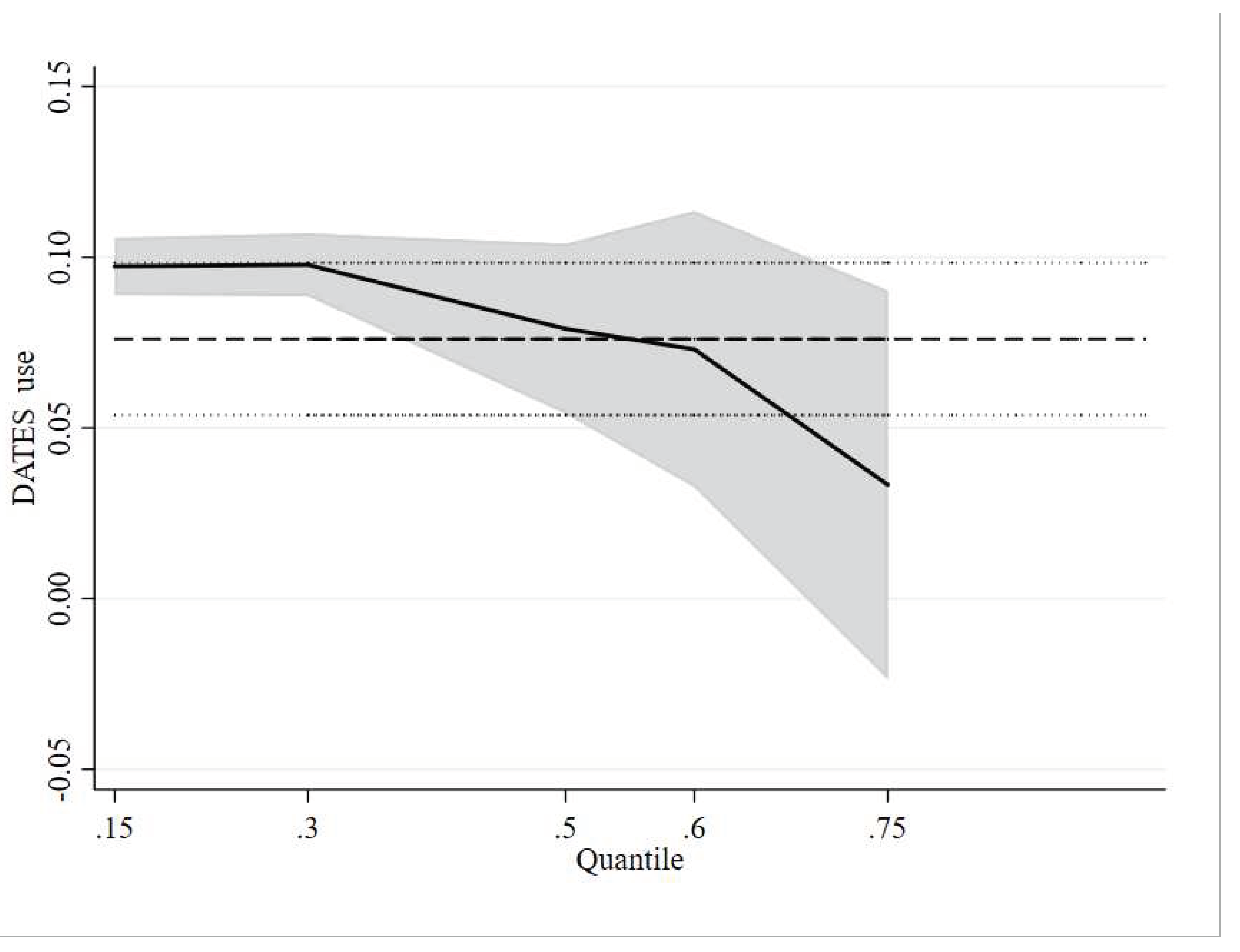
| Variables | Definition | Total | DATES Users | DATES nonusers | Difference |
|---|---|---|---|---|---|
| EE | ranges from 0 to 1 | 0.671 | 0.702 | 0.608 | 0.094*** |
| DATES use | 1 = yes, 0 = no | 0.677 | 1.000 | 0.000 | 1.000*** |
| Communication signal strength | very bad, bad, average, good and excellent equal to 1-5, respectively | 2.535 | 2.799 | 1.979 | 0.820*** |
| Age | age of respondents | 48.479 | 46.786 | 52.036 | -5.250*** |
| Gender | 1 = male, 0 = female | 0.749 | 0.820 | 0.600 | 0.220*** |
| Health status | 1=very poor, 2=poor, 3=fair, 4=better, 5=very good | 3.858 | 4.051 | 3.665 | 0.386*** |
| Education | years of education | 11.044 | 11.772 | 9.514 | 2.258*** |
| Off-farm work | 1 = yes, 0 = no | 0.523 | 0.541 | 0.486 | 0.055 |
| Village leader | 1 = yes, 0 = no | 0.157 | 0.197 | 0.071 | 0.126*** |
| Farm size | maize planted area (hectare) | 0.730 | 0.860 | 0.519 | 0.340*** |
| Income from other crops | other crops gross revenue in 2022 (ten thousand yuan 1/ha) | 5.300 | 5.345 | 5.025 | 0.320** |
| Labor | number of laborers per household | 2.320 | 2.452 | 2.213 | 0.239 |
| Degree of specialization | maize production area/all arable area, % | 0.515 | 0.515 | 0.513 | 0.002 |
| Digital technology training | 1 = yes, 0 = no | 0.468 | 0.476 | 0.451 | 0.025* |
| Market distance | Distance from the household to the nearest central market (km) | 9.949 | 10.035 | 9.830 | 0.205 |
| Group | Mean | Standard Deviation |
Min | Max |
|---|---|---|---|---|
| DATES users | 0.702 | 0.187 | 0.481 | 1 |
| DATES nonusers | 0.608 | 0.189 | 0.397 | 0.9 |
| All | 0.671 | 0.192 | 0.397 | 1 |
| Variable | ESR | ||
|---|---|---|---|
| Selection equation | Outcome equations (EE) | ||
| DATES users | DATES nonusers | ||
| Age | -0.003*** | -0.002*** | -0.003** |
| (0.004) | (0.001) | (0.001) | |
| Gender | 0.613*** | 0.079*** | 0.011 |
| (0.094) | (0.017) | (0.022) | |
| Health status | 0.156*** | -0.076 | -0.079 |
| (-0.058) | (0.076) | (0.184) | |
| Education | 0.041*** | -0.001 | 0.002 |
| (0.015) | (0.002) | (0.004) | |
| Off-farm work | 0.248*** | -0.011 | 0.030 |
| (0.081) | (0.012) | (0.019) | |
| Village leader | 0.319** | 0.068*** | -0.053 |
| (0.130) | (0.017) | (0.035) | |
| Farm size | 0.167** | -0.025*** | -0.029*** |
| (0.042) | (-0.005) | (0.010) | |
| Income from other crops | -0.695** | 0.252*** | 0.194** |
| (0.298) | (0.043) | (0.077) | |
| Labor | -0.049 | -0.016*** | -0.012 |
| (0.042) | (0.006) | (0.010) | |
| Specialization degree | -0.127 | -0.015 | -0.108*** |
| (0.134) | (0.020) | (0.031) | |
| Market distance | -0.078 | -0.023*** | 0.007 |
| (0.054) | (0.008) | (0.011) | |
| Digital technology training | 0.070 | -0.031** | -0.058*** |
| (0.083) | (0.013) | (0.018) | |
| Communication signal strength | 0.355*** | ||
| (0.039) | |||
| Constant | -0.652* | 0.995*** | 0.767*** |
| (0.372) | (0.057) | (0.092) | |
| -1.712*** | |||
| (0.031) | |||
| -1.748*** | |||
| (0.050) | |||
| -0.505*** | |||
| (0.107) | |||
| -0.253 | |||
| (0.250) | |||
| Durbin-Wu-Hausman | 30.009*** | ||
| Cragg-Donald Wald F Statistic | 70.965 | ||
| Stock-Yogo critical values under 10% bias | 16.380 | ||
| LR test of independentequations | 16.660*** | ||
| Group | Use | No use | ATT | ATU |
|---|---|---|---|---|
| DATES users | 0.701 | 0.553 | 0.148*** | — |
| DATES nonusers | 0.822 | 0.608 | — | 0.214*** |
| Items | ESR | TEM | OLS |
|---|---|---|---|
| Coefficient of DATES use | — | 0.188*** | 0.076*** |
| (0.026) | (0.011) | ||
| ATT | 0.148*** | — | — |
| (0.004) | |||
| ATU | 0.214*** | — | — |
| (0.005) | |||
| Control variables | Yes | Yes | Yes |
| Items | EE | ||||
|---|---|---|---|---|---|
| 15th | 30th | 50th | 60th | 75th | |
| DATES users | 0.097*** | 0.098*** | 0.079*** | 0.073*** | 0.033 |
| (0.005) | (0.005) | (0.011) | (0.019) | (0.028) | |
| Control variables | Yes | Yes | Yes | Yes | Yes |
| Pseudo R2 | 0.193 | 0.141 | 0.083 | 0.115 | 0.156 |
| Variable | EE | Adoption of organic fertilizer | Adoption of green pesticide | Adoption of biodegradable agricultural films | EE |
|---|---|---|---|---|---|
| DATES use | 0.094*** (0.011) |
0.171*** (0.029) |
0.188*** (0.029) |
0.180*** (0.029) |
|
| Adoption of organic fertilizer | 0.094*** (0.010) |
||||
| Adoption of green pesticide | 0.068*** (0.010) |
||||
| Adoption of biodegradable agricultural films | 0.058*** (0.011) |
||||
| Control variables | Yes | Yes | Yes | Yes | Yes |
| Number of observations | 1302 | 1302 | 1302 | 1302 | 1302 |
Disclaimer/Publisher’s Note: The statements, opinions and data contained in all publications are solely those of the individual author(s) and contributor(s) and not of MDPI and/or the editor(s). MDPI and/or the editor(s) disclaim responsibility for any injury to people or property resulting from any ideas, methods, instructions or products referred to in the content. |
© 2024 by the authors. Licensee MDPI, Basel, Switzerland. This article is an open access article distributed under the terms and conditions of the Creative Commons Attribution (CC BY) license (http://creativecommons.org/licenses/by/4.0/).





